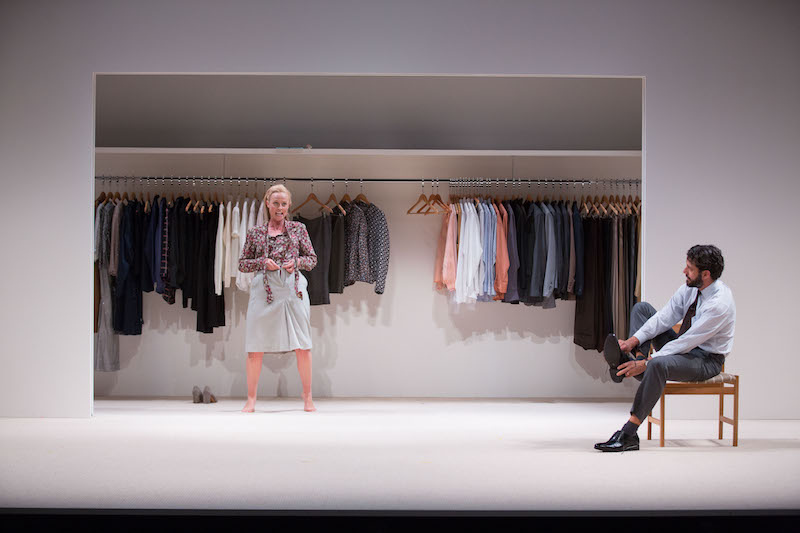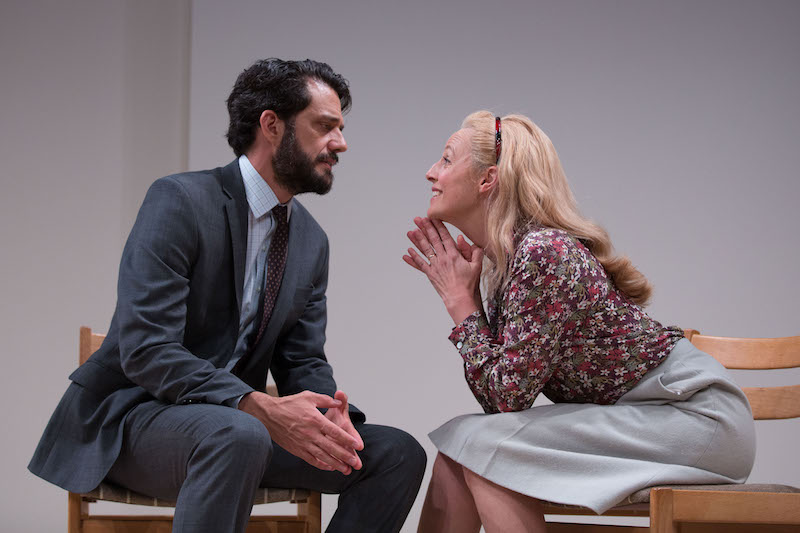Watching Scenes from a Marriage is in many respects akin to being psychologically abused, such is the impact of the play and the text upon the unsuspecting listener. Can human beings really behave this way to each other, particularly to the person who is closest to them? Can they be this ruthless and cruel, lacking empathy, tenderness or love within a relationship that had once seemed near-perfect? We know such behaviour to be true from examining any abusive relationship, but the rawness and pain of this piece of theatrical reality punches hard and perhaps asks more questions than it answers.
 Marta Dusseldorp and Ben Winspear. Photograph © Rob Maccol
Marta Dusseldorp and Ben Winspear. Photograph © Rob Maccol
Joanna Murray-Smith’s adaptation for the stage of Ingmar Bergman’s celebrated 1970’s television miniseries slices through a seemingly idyllic marriage to uncover not just cracks but disturbing and deep-seated animosity, even hatred. So confronting was the original mini-series when it was first screened that divorce rates in Sweden almost doubled within a year.
Murray-Smith’s play is cleverly and wittily written with some great one-liners that predominantly roll off the tongue of the main protagonist, Johan (Ben Winspear). He is married to Marianne (Marta Dusseldorp). They both outwardly appear to have fulfilling careers, an active social life, an impressive home and two young daughters. And they are happy or so they say.
Interestingly we only see the two daughters on stage when the play opens and they never reappear. A house with children is always full of their noise and toys but in this work they become ghosts in the background, their parents’ relationship brought centre stage without the children’s presence. This gave the play a heightened sense of reality aided by the use of language not normal in our everyday speech. Such a device also separated us from the main protagonists, reminding us that we are watching a play no matter how real the characters might appear.
When we first meet them, being interviewed for a magazine article about their amazing marriage, neither Johan nor Marianne are characters one can warm to or much like. He is a smart-arse; opinionated, arrogant and quite smug. Despite her own independent career, Marianne seems happy on one level to play the subservient wife, at the same time manipulating and managing their lives from behind. She gets what she wants.
Ben Winspear and Marta Dusseldorp, real-life husband and wife, are unequivocally excellent in their respective roles, the complexity of their characters beautifully textured and layered, demonstrating what it means to be human with all its frailty and absurdity. They worked brilliantly together on stage, as might be expected, managing an all-too-real physical fight scene exceptionally well.
 Ben Winspear and Marta Dusseldorp. Photograph © Rob Maccol
Ben Winspear and Marta Dusseldorp. Photograph © Rob Maccol
Dusseldorp was particularly effective in the pregnancy and hospital scenes, demonstrating a vulnerability, her need for love and tenderness, unreciprocated from the self-centred Johan. With Johan about to leave her for another woman, she is both terrific and terrifying in the cottage scene, not knowing what to do first or how to react. Murray-Smith’s text is particularly truthful and effective here. Meanwhile, Johan spits everything out, all the venom, speaking and behaving appallingly and with no sense of shame. The scene was totally uncomfortable to watch with both actors bravely taking their roles to the absolute limits.
In cameo roles, Hugh Parker’s Peter is an angry and bitter husband to Christen O’Leary’s equally pugnacious Katerina. Parker also gave us a delicious vignette with Johan’s Scottish colleague, Arne. O’Leary’s sad Mrs Jacobi, wanting a divorce from the husband she has never loved, brought a gasp from the audience when admitting to never having loved her children either. All the taboos are here for the picking. Loani Arman was both the journalist and Johan’s pleasant colleague and sexual partner, Eva.
Director Paige Rattray tells the stories of these Scenes with a sincerity and truthfulness that make them particularly poignant. Moreover, her attention to detail is first-rate from the smallest of the cameos to the big physical and mental battles. She is assisted by a set that in its simplicity moves the action swiftly so we do not lose momentum. David Fleischer’s plain white box with minimal furniture and upstage entrances works really well, while opening up the back walls for the cottage scene adds an extra dimension. Ben Hughes’ lighting added depth to the stage and was particularly effective in creating mood and atmosphere.
Ultimately this is not an easy night in the theatre, though the powerful script allows for nervous laughter in the most confronting and disarming of moments. A polished production, well-directed and with a first-rate cast delivers with authority and no fear, holding our attention. However difficult this truth might be, it is a play that stays with you long after the curtain has gone down, hopefully making us re-examine those all-important key relationships.
Queensland Theatre’s Scenes from a Marriage plays at the Playhouse, QPAC until December 3.











Comments
Log in to join the conversation.